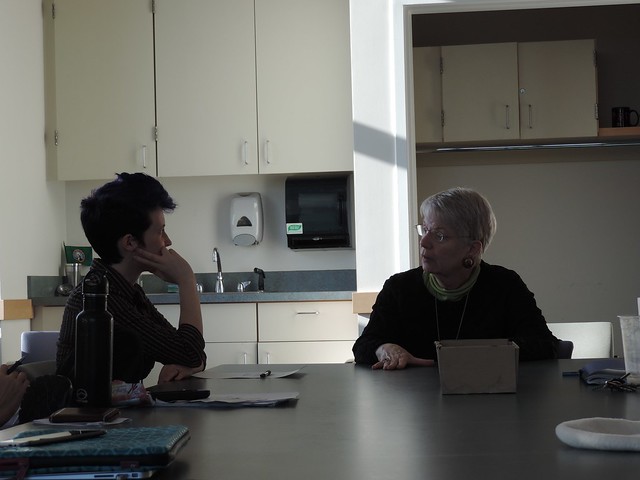As part of her visit to campus for the Danz lecture last week, Jill Cornell Tarter spent some time answering questions and discussing science and her experiences with WCS members. Here are a few of the interesting and thought-provoking things we learned about Dr. Tarter and SETI:
Dr. Tarter’s favorite color is blue, her hobbies include flying small planes and samba dancing, and her favorite element on the periodic table is silver. If she could visit any other planet (without concern for environmental or technological restrictions), she would visit Mars to look for signs of life in its subsurface aquifers. Her second-favorite movie is Awakenings, which tells the story of Oliver Sacks and his work with a drug that could awaken catatonic patients. She is currently reading the book What If? by Randall Munroe, creator of the xkcd webcomic.
While she’s had an accomplished career and is very well-respected in her field, Dr. Tarter faced a lot of challenges during her undergraduate and graduate education. She was the only woman in her class of 300 engineering majors at Cornell. Since the women’s dorms were locked from 10 pm to 6 am, she had to do all of her problem sets alone while her classmates were working together in the men’s dorms. She received a generous scholarship from Procter & Gamble, but when she got married, her scholarship was cancelled, as they assumed she would leave college to start a family. Instead, she was already planning to go to graduate school for astronomy (the administration at Cornell advocated for her, and she got her scholarship back). When she started graduate school, someone told her and the other two women in her class that they were “lucky” to be there because all the smart men had been drafted for Vietnam. However, she persisted and was able tok
Dr. Tarter spoke very highly of the movie Contact, whose main character was based on her. Carl Sagan, who was on the board of SETI and knew a lot about its research, wrote the original film treatment as well as the novel (published before the film was actually made). The most significant mistake in the film is when Ellie Arroway says “You know, there are four hundred billion stars out there, just in our galaxy alone. If only one out of a million of those had planets, and just of out of a million of those had life, and just one out of a million of those had intelligent life; there would be literally millions of civilizations out there.” – the math just doesn’t work out. Other than that, the movie was very realistic in its portrayal of science and SETI. Jodie Foster, who played the protagonist and worked closely with Dr. Tarter to get her character right, said that her goal wasn’t to teach the audience about science, but to show them that scientists are real people.
I also learned a lot about the way SETI does science. Its goal is not specifically to find extraterrestrial intelligence, but to answer the question of whether or not it exists. Dr. Tarter was careful to make this distinction, refusing to make assumptions about possible alien life and emphasizing that she doesn’t know the answers to many related questions. SETI scientists have to be very rigorous when it comes to investigating any signal. They must consider all potential explanations, including the possibility of a hoax conducted by someone trying to fool them. Dr. Tarter is also very aware of the potential implications of her work, and what finding a signal would mean for human civilization.
It was inspiring to be able to spend some time talking to Dr. Tarter about her life and work, in contrast with the big-picture, meaning-of-life (but also inspirational) tone of her public lecture.


